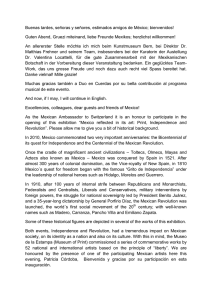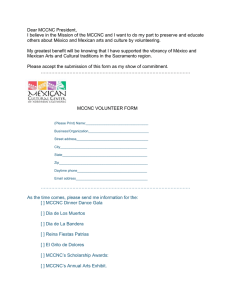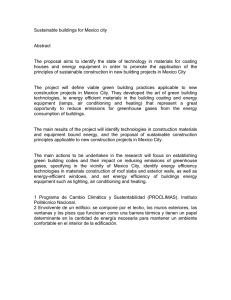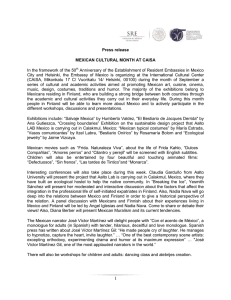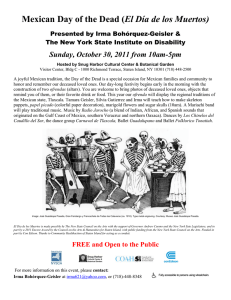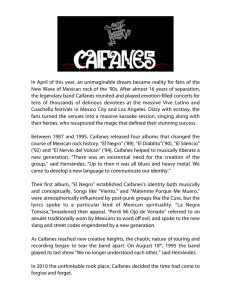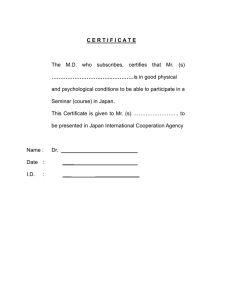Homologation and/or Insertion in Mexico of a US
Anuncio
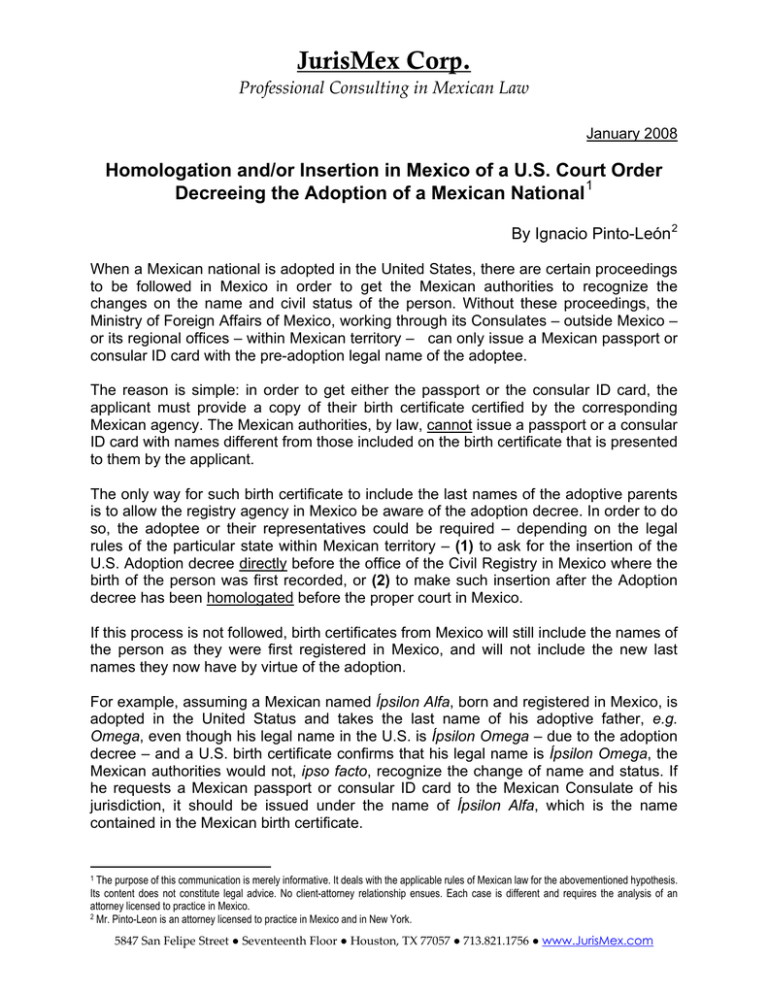
JurisMex Corp. Professional Consulting in Mexican Law January 2008 Homologation and/or Insertion in Mexico of a U.S. Court Order Decreeing the Adoption of a Mexican National 1 By Ignacio Pinto-León 2 When a Mexican national is adopted in the United States, there are certain proceedings to be followed in Mexico in order to get the Mexican authorities to recognize the changes on the name and civil status of the person. Without these proceedings, the Ministry of Foreign Affairs of Mexico, working through its Consulates – outside Mexico – or its regional offices – within Mexican territory – can only issue a Mexican passport or consular ID card with the pre-adoption legal name of the adoptee. The reason is simple: in order to get either the passport or the consular ID card, the applicant must provide a copy of their birth certificate certified by the corresponding Mexican agency. The Mexican authorities, by law, cannot issue a passport or a consular ID card with names different from those included on the birth certificate that is presented to them by the applicant. The only way for such birth certificate to include the last names of the adoptive parents is to allow the registry agency in Mexico be aware of the adoption decree. In order to do so, the adoptee or their representatives could be required – depending on the legal rules of the particular state within Mexican territory – (1) to ask for the insertion of the U.S. Adoption decree directly before the office of the Civil Registry in Mexico where the birth of the person was first recorded, or (2) to make such insertion after the Adoption decree has been homologated before the proper court in Mexico. If this process is not followed, birth certificates from Mexico will still include the names of the person as they were first registered in Mexico, and will not include the new last names they now have by virtue of the adoption. For example, assuming a Mexican named Ípsilon Alfa, born and registered in Mexico, is adopted in the United Status and takes the last name of his adoptive father, e.g. Omega, even though his legal name in the U.S. is Ípsilon Omega – due to the adoption decree – and a U.S. birth certificate confirms that his legal name is Ípsilon Omega, the Mexican authorities would not, ipso facto, recognize the change of name and status. If he requests a Mexican passport or consular ID card to the Mexican Consulate of his jurisdiction, it should be issued under the name of Ípsilon Alfa, which is the name contained in the Mexican birth certificate. 1 The purpose of this communication is merely informative. It deals with the applicable rules of Mexican law for the abovementioned hypothesis. Its content does not constitute legal advice. No client-attorney relationship ensues. Each case is different and requires the analysis of an attorney licensed to practice in Mexico. 2 Mr. Pinto-Leon is an attorney licensed to practice in Mexico and in New York. 5847 San Felipe Street ● Seventeenth Floor ● Houston, TX 77057 ● 713.821.1756 ● www.JurisMex.com JurisMex Corp. Professional Consulting in Mexican Law The solution to this common problem is to register the adoption decree in the registry office of the particular state of Mexico where the birth was recorded originally. (1) In some states, the record of the adoption decree can be done directly before the office of the Civil Registry in Mexico. The documents generally required for the inscription are: a. Certified, apostilled copy of the adoption decree. The apostille is a certification or authentication made by the Office of the Secretary of State of the U.S.’ state where the adoption took place. b. Certified, apostilled copy of the new birth certificate issued by the county where the adoption took place. c. Translation from English into Spanish of the apostilled adoption decree, made by an expert authorized 3 by the highest court of the state of Mexico where the record will take place. d. Translation from English into Spanish of the apostilled copy of the new birth certificate issued by the county where the adoption took place, made by an expert authorized by the highest court of the state of Mexico where the record will take place. (2) In other states, the adoption decree must be homologated before recording the adoption decree as described in the previous paragraph. The homologation is a court proceeding initiated before a Mexican judge where the latter, after analyzing the adoption decree by a foreign government, certifies that it complies with the laws of Mexico. Once the judge homologates the adoption decree, it can be recorded at the office of the Civil Registry, as explained in paragraph 1. Going back to our example, Ípsilon Alfa or his representatives would have to choose either to record directly the adoption decree, or to have it homologated first, depending on the rules of the specific state where the proceeding is to take place. If the state where Ípsilon Alfa’s birth was originally recorded is one of those that do not require homologating the adoption decree, Ípsilon or his representatives should ask the office of the Civil Registry to record the U.S. adoption, properly translated into Spanish, so his new legal name can be registered: Ípsilon Omega. Afterwards, he can request a certified copy of his birth certificate where his new name will be included: Ípsilon Omega. If, on the other hand, the proceeding takes place in a state that requires homologation of the U.S. adoption decree, Ípsilon must ask a judge of the jurisdiction to certify that the adoption decree complies with all legal requirements for The highest court of each state of the Mexican Republic publishes a list of people recognized as authorized translators. The translation of the adoption decree abovementioned must be made by one of those translators authorized by the highest court of the state where the adoption decree is to be recorded. 3 5847 San Felipe Street ● Seventeenth Floor ● Houston, TX 77057 ● 713.821.1756 ● www.JurisMex.com JurisMex Corp. Professional Consulting in Mexican Law adoptions in Mexico. Ípsilon will then be able to request the record of the homologated adoption decree as described on the previous paragraph. After the proceedings are completed, new certified copies of the Mexican birth certificate should reflect the new legal name of the Mexican that has been adopted. Then the Ministry of Foreign Affairs of Mexico, working through its Consulates – in the United States or any country other than Mexico – or its regional offices – within Mexican territory – would be able to issue a passport or consular ID card, based on the new certified copy of the adoptee’s birth certificate that includes the last names of their adoptive parents. In our example, Ípsilon’s new Mexican birth certificate will state that his last name is Omega, and with a certified copy of such document, he will be able – if compiles with the rest of the requirements – a passport or a consular ID card from the Mexican government, with his new name: Ípsilon Omega. In conclusion, the proper steps to obtain a Mexican birth certificate that includes the change on the name of a Mexican adopted in the United States – or any country other than Mexico – are the following: 1. To apostille a certified copy of the adoption decree before the Secretary of State where the adoption took place. 2. To apostille before the Secretary of State a certified copy of the birth certificate issued by the county where the adoption took place where the new legal name of the adoptee is included. 3. Translate both apostilled documents – 1. and 2. – from English into Spanish. The translation must be done by an expert authorized by the highest court of the state of Mexico where the homologation and/or inscription is to take place. 4. Determine whether the state of the Mexican Republic where the proceedings are to take place allows for direct inscription of the adoption decree – (1) – or demands the homologation as a previous step – (2). 5. Accordingly, request the homologation and/or the inscription of the adoption decree, once it has been properly apostilled and translated. 6. To request in Mexico a certified copy of the birth certificate of the adoptee that should include the new legal name of the adopted Mexican. 5847 San Felipe Street ● Seventeenth Floor ● Houston, TX 77057 ● 713.821.1756 ● www.JurisMex.com
